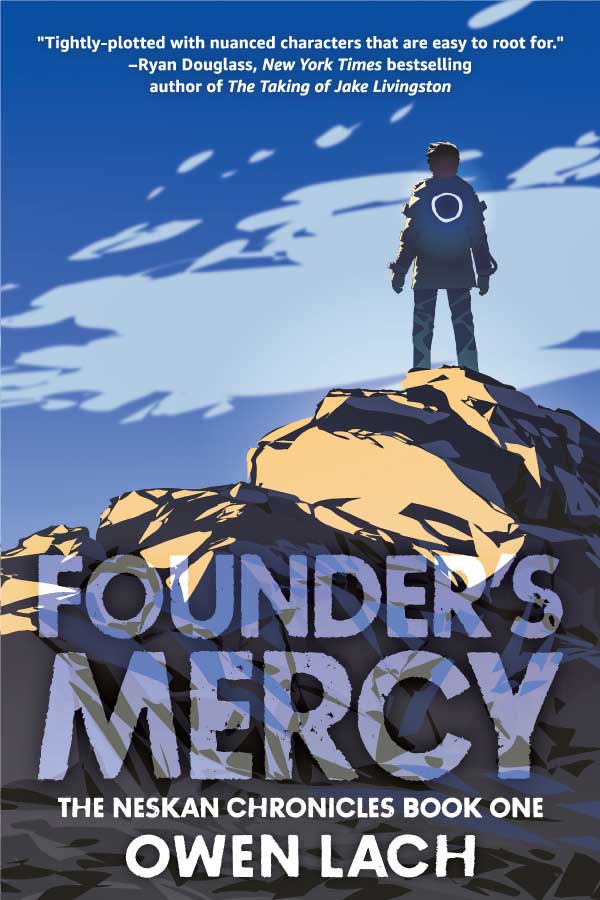“I’ve heard horror stories about it,” Lach admits when I asked about traditional publishing. “Especially when it comes to a marginalized author. Especially when it comes to YA.”
Perhaps that’s why Owen Lach chose to go with an indie publisher for their debut novel, Founders Mercy. Doing so meant Lach had to forgo any five-figure advances and, most likely, any chance at making a mass media bestseller list. But doing so also meant that Lach’s book would actually get published.
Writing a book is a sizable commitment, especially when there’s no guarantee that anyone will ever see it, let alone like it. Between self publishing, indie publishing, and traditional publishing, authors publish millions of new books every year. Some authors struggle with choices like that. But not Lach.
“I don’t want to say it was a whim,” Lach tells me. “I’ve been writing for a long time, even if it wasn’t books. But the world changed pretty hard and fast a couple years ago. I lost some opportunities I’d made for myself. And turning to writing a book seemed like a good way to stay in the game. So, let’s just say it didn’t take much thought once I decided to go for it.”
Nothing about Founder’s Mercy feels like a whim. The book is solidly written, with a well-structured and researched plot and a bevy of nuanced characters. We should all be so lucky to find the drive and motivation to put out such work during a pandemic. But Lach’s script and screenwriting roots are also all over the story, evident in everything from the brisk, cinematic action scenes and snappy, film-friendly dialogue down to its four-act structure. That’s not to say that translating from scripts to novels was easy for Lach.
“I’m a visual writer, for sure,” Lach explains. “You have to be when you’re writing for a visual medium. That made me stumble a bit when I first started transitioning into an author. You can’t write a book the same way you write a script. There’s so much more that you have to include, for starters. But it’s also very empowering. Instead of relying on a director’s or actor’s vision to bring scenes to life, it’s all me. I’m the director, and the actors live in my head.”
Another reason Lach chose to go the indie publishing route was the importance of finding a publisher who understood the queerness of the material.
“I like to read, but I often struggle to find the types of books I’m looking for,” Lach says. “You know, the books with queer or trans characters that aren’t about them being queer or trans. Where the queer people take center stage instead of being token side characters, but they’re doing the things you read in other sci-fi or fantasy books.
“I found that when I read Into the Lightning Gate, which inspired me to believe that my story could be published, too. In Founder’s Mercy, Adan’s queer. But the story’s about so much more than that.”
Adan, the teenage main character of Founder’s Mercy, is relatable in a way that even non-queer people will understand. Adan’s struggles, including questions of identity and how he relates to the world, are universal. Still, Lach’s choice to place Adan in an environment where he was oppressed but not subject to homophobia was risky. Even some reviewers claimed it would sidetrack the story and diminish the oppressiveness of the place where Adan lives.
“I get that,” Lach admits. “Homophobia, racism, xenophobia, misogyny–they’re all so pervasive in this world. But Adan doesn’t live in this world. He lives in a world where those things don’t necessarily exist. From my perspective, Neska [the book’s setting] is an example of how some people are always controlling and power-hungry. And If you take away tools like homophobia, they’ll just find another one. And that’s not unrealistic at all.”
Lach makes a good point, considering the variety of ways humankind has dreamed up to oppress one another over our long history. And while Adan may live in a world free of homophobia and racism, Lach does not.
“Sure, it’s something I think about,” Lach says. “There are gonna be people who won’t like the book, who won’t even read it because the main character is queer. How can I not? Especially with all the recent resurgence in book bannings and discriminatory, anti-queer laws. I know it’s gonna happen with Founder’s Mercy, too. In fact, I’ve already seen the anonymous 1-star reviews pop up.
“But I won’t let that stop me. I want some young queer kid out there to read a book with a character that feels like them, you know? I want that reader to inhabit a world where they don’t have to worry about being queer, even if it’s only for a little while. Because that world could exist. If I can imagine it, so can others, right? If it’s possible to imagine it, it’s possible to make it happen.”
That’s a refreshingly optimistic sentiment in a world that begs for pessimism daily. And it’s a sentiment that finds its way into the underlying theme of Founder’s Mercy. Adan goes from anonymous and powerless to known and powerful. Adan is given the tools to fight back against his oppressors and uses them. Even if that use is a little selfish.
Lach laughs when I point that out. “Yeah, well, Adan is still young. Of course, he’s gonna be confused. He’s gonna have conflicting motivations. He’s gonna make mistakes. All young people do. But the point is that he still tries. He’s not a reluctant hero.”
Founder’s Mercy is billed as the first book of the Neskan Chronicles, which means readers can expect more of Adan’s adventures to come. Given how big Adan’s world gets by the end of the first book, I wonder what readers will see in book two.
“Neska’s a big place,” Lach explains. “We’ve only just scratched the surface of it. Adan will see so many places. There’s a lot of trouble yet to find him.”

Founder's Mercy
Founder’s Mercy was released on March 22, 2022, by Jetspace Studio. It’s available for Kindle, Kindle Unlimited, and in paperback from Amazon.

